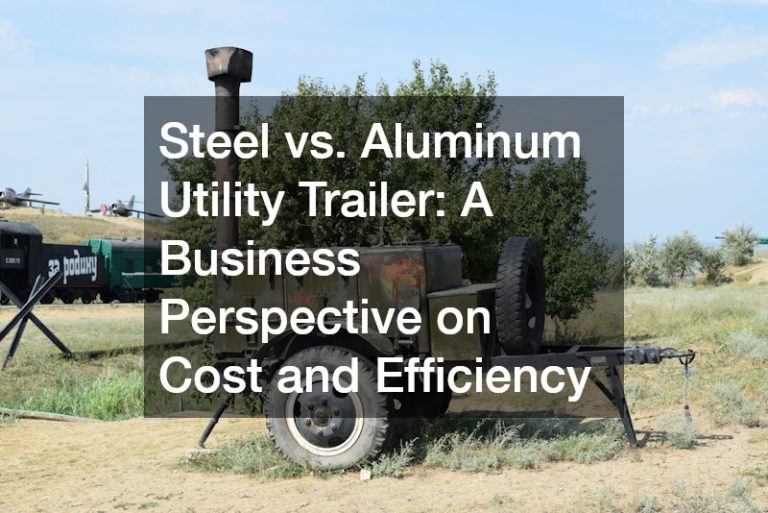Steel vs. Aluminum Utility Trailer: A Business Perspective on Cost and Efficiency . Choosing the right trailer for your business is a critical decision that can impact your operations and bottom line. Whether you are in landscaping, construction, or transportation, the debate between steel and aluminum utility trailers is a common one. By comparing a side by side trailer, you can better understand the advantages and disadvantages of each material, ultimately making an informed decision that suits your business needs.
This article explores these factors, providing a comprehensive business perspective on choosing steel and aluminum utility trailers.
Identifying the Material: Steel vs. Aluminum The first step in choosing between a steel and an aluminum utility trailer is understanding how to identify the material. Typically, steel trailers are painted black and have a distinctive solid appearance, while aluminum trailers exhibit a shiny, silver sheen. This visual distinction helps businesses quickly identify the type of trailer best suited for their needs.
Pros and Cons of Steel Utility Trailers Pros of Steel Utility Trailers Cost-Effectiveness: One of the primary advantages of steel trailers is their cost-effectiveness. Businesses often find that an open utility trailer made of steel can be significantly less expensive than its aluminum counterpart. This cost difference becomes even more pronounced with enclosed trailers, where savings can reach thousands of dollars.
Durability and Strength: Steel is renowned for its strength and durability. For businesses that require a trailer for heavy-duty, daily commercial use, such as landscaping or construction, a steel trailer is often the preferred choice. Steel’s robustness allows it to withstand the rigors of constant loading and unloading, making it ideal for commercial applications.
Structural Options: Steel trailers often feature angle iron construction, an L-shaped piece of metal providing additional strength. This structural design is typically not feasible with aluminum due to its lower strength. Angle iron construction can also contribute to the cost savings associated with steel trailers.
Cons of Steel Utility Trailers Weight: Steel trailers are heavier than aluminum trailers. This increased weight can affect fuel efficiency and the towing capacity of the vehicle hauling the trailer. Businesses must consider these factors, especially if their vehicles have limited towing capacity.
Rust and Corrosion: Steel is prone to rust and corrosion, particularly in regions with harsh weather conditions or where road salt is commonly used. However, many manufacturers now offer rust-preventative measures, such as powder coating or specialized undercoating sprays, to mitigate this issue.
Pros and Cons of Aluminum Utility Trailers Pros of Aluminum Utility Trailers Lightweight: Aluminum utility trailers are significantly lighter than steel trailers, often weighing only two-thirds as much. This reduced weight improves fuel efficiency and makes towing easier, particularly for businesses that use smaller vehicles. For example, a 16-foot enclosed aluminum trailer may weigh around 1,800 pounds, compared to 2,600-2,800 pounds for a steel trailer of the same size.
Rust Resistance: Aluminum does not rust, making it an excellent choice for businesses operating in regions with high humidity, frequent rain, or snow. The corrosion-resistant nature of aluminum ensures a longer lifespan and less maintenance than steel trailers.
Aesthetic Appeal: Aluminum trailers are often more polished and aesthetically pleasing. They typically feature screwless designs and aluminum rims, which add to their visual appeal. An aluminum trailer can be a more attractive option for businesses prioritizing branding and image.
Cons of Aluminum Utility Trailers Higher Cost: The primary drawback of aluminum trailers is their higher upfront cost. While they offer many benefits, businesses must weigh these advantages against the required initial investment. However, the long-term maintenance and fuel efficiency savings can offset the higher purchase price over time.
Lower Structural Strength: Although aluminum is durable, it is not as strong as steel. Aluminum trailers usually utilize tubular construction rather than angle iron, which can limit their ability to handle extremely heavy loads. Businesses must consider their specific usage requirements when choosing between steel and aluminum.
Making the Right Choice for Your Business When deciding between a steel and an aluminum utility trailer, businesses should consider several factors, including cost, durability, maintenance, and the specific needs of their operations. A steel trailer might be the best choice for heavy-duty, daily commercial use due to its strength and lower cost. However, an aluminum utility trailer could be the more suitable option for businesses that prioritize fuel efficiency, ease of towing, and long-term durability.
In conclusion, steel and aluminum utility trailers have advantages and disadvantages. By carefully evaluating these factors, businesses can make an informed decision that maximizes efficiency and cost-effectiveness, ultimately supporting their operational goals and bottom line. Whether opting for the robustness of steel or the lightweight, rust-resistant qualities of aluminum, the right choice will depend on each business’s unique needs and priorities.
.





